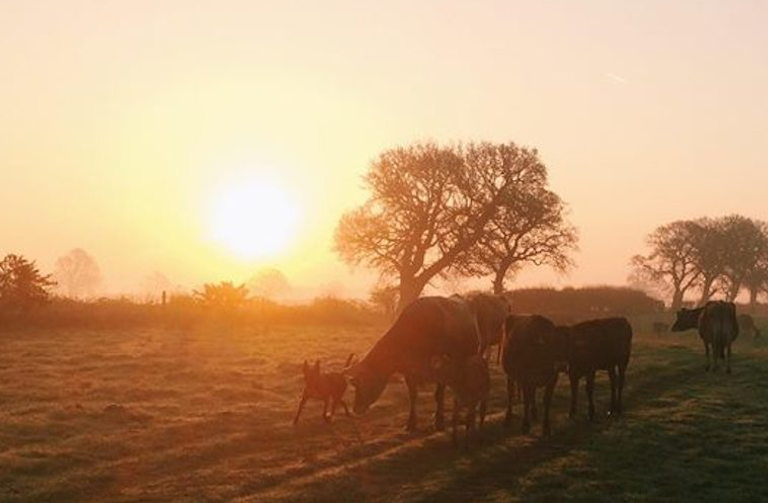Our current food system is monopolised by supermarkets, creating a centralised flow of products to consumers. If any single link is broken in this chain, stretching from production to the supermarket shelf, the whole system collapses. The spread of disease and the resulting lockdown in the current COVID-19 pandemic, has damaged the links in this chain; it has tested the system and seen it struggle, leading to empty shelves, anxiety and panic buying, with people struggling to access food. Climate change is likely to continue placing stress on the system in a similar way.
Compare this centralised supermarket chain instead to a network of local farms, abattoirs, processing units, packhouses, butchers and retail outlets. This more diverse and expansive network is inherently more stable: the loss of one connection does not disrupt the whole system. It provides an infrastructure to deliver food to local populations in a secure and resilient manner.
This is what the Sustainable Food Trust (SFT) has been calling for during its entire eight years of existence: more resilient, localised and shortened supply chains to provide everyone with nutritious food, sustainably produced.
Monopolisation by supermarkets and the price pressures they place on producers to supply consumers with cheap (but dishonestly priced) products have been especially damaging to the dairy industry, in terms of people’s livelihoods, animal welfare and the health of the planet. The way most dairies are able to survive is to rely on economies of scale: getting bigger and intensifying, producing more outputs for less inputs. In this way farmers become ‘commodity slaves, trapped in unsustainable farming systems’ and cows are reduced to milk-producing machines, with male calves an unprofitable by-product.
But it doesn’t have to be like this.
One of the best ways to source dairy in an ethical and sustainable way, for those of us who choose to consume it, is to buy it directly from farms. Instead of shelves of unfairly-priced milk from faceless farmers and uncertainty around production methods, consumers can get to know both farmer and their animals, and the animal welfare and environmental standards of the farm. The transparency offered by farms selling directly to the public is hard to rival; most, if not all, encourage visits to see the animals and witness their lifestyles and treatment first-hand.
There are many farms in the UK that sell their milk and other dairy products directly. Very helpfully, Farmers Weekly has created a map of UK farmers who provide this service, ‘cutting out the supermarket or middleman’, through online shops and contact-free delivery in the face of the pandemic. They have also published advice for farmers thinking of selling directly from their farm.
There are a diverse array of farms currently selling to the public from micro-dairies (usually defined as having 40 cows or less), to some much larger farms – for example, Meggy Moo’s in Dorset, with 180 Holsteins, selling milk from a vending machine on their farm. But certainly, all are of a scale that is a far cry from the mega-dairies, defined as having over 700 cows, that are creeping into our countryside because they currently represent the best business case for dairy farmers in order to survive. On smaller farms, cows are known and cared for as individuals, rather than anonymous milking units. Fitting with this ethos of respect for animals comes respect for the environment. For example, Sam and Katie Bullingham of Taw River Dairy in Devon, say ‘We believe that happy cows produce happy milk, and we think that because our cows are grazing as many days as possible and all rear their own calves, that they must be among the happiest cows in the country. Taw River Dairy has always been about caring for our environment; wherever possible we use sustainable options, from re-usable glass bottles to compostable ice cream spoons. All our land and animals are farmed organically, and we have our own beehives; our bees are important in the pollination of our herbal and grass leys.’ Like Taw River Dairy, there are many examples of small dairies selling directly to the public that practice ‘calf-at-foot’ systems, where calves are allowed to remain with their mothers for several weeks or months, even up to their natural weaning age of around 9 months.
Farms are putting in extra measures to protect both customers and themselves during the COVID-19 pandemic. Stroud Micro Dairy, for example, has installed a hand-washing facility outside the small cabin where they sell their milk, and it has also put in place a ‘one in, one out’ policy for customers. Those with vending machines dispensing milk for customers like Meggy Moo’s, regularly clean the machines and other contact points throughout the day, as well as providing antibacterial wipes to customers. ‘We are sterilising the shop every morning,’ says Ian Curtis of The Humble Dairy in Dorset, who sell their milk from a calf-at-foot system in a shop on their farm. ‘This includes the door handle, the table, window sill, the handle on the fridge, etc. We also provide hand sanitiser for our customers to use.’
How is the pandemic affecting these ‘direct from the farm’ businesses? The ones I spoke to are seeing increased custom. ‘As for how the crisis has affected us, it definitely brought in a lot more custom,’ says Ian Curtis. ‘Initially there was crazed panic buying and our customers were completely emptying us of eggs and milk. We had to put up a sign limiting customers to half a dozen eggs. Demand has now levelled off to be more consistent, but we are definitely selling more. Quite a lot of people are walking up from the village to buy from us, who maybe didn’t buy from us before.’ Kees Frederiks of Stroud Micro Dairy is seeing something similar. Stroud Micro Dairy runs on a Community Supported Agriculture model, where customers must join as members to buy produce. ‘Our custom has increased – the majority of this has come from people who already know about us and have wanted to join, and now [with the coronavirus pandemic and lockdown] have the impetus or time to do something about it.’ This illustrates how the effect of the current pandemic is making many of us re-evaluate how we source our food, and could represent a change for the better if consumers stick to giving their custom to local producers, rather than slipping back into old supermarket habits once the pandemic has passed.
Rainton Farm, also known as ‘The Ethical Dairy’, the UK’s largest calf-at-foot farm with just over 130 cows, does not sell milk directly but sells cheese via their website and speciality shops, and ice cream through wholesale channels. They have seen an increase in demand for their cheese online, which they’ve encouraged in order to maintain steady sales levels, as demand from retail and hospitality customers has dropped.
‘We have communicated regularly and clearly with our customers through social media and e-newsletters to keep people up to date on our stock and delivery status,’ says Wilma Finlay of Rainton Farm. ‘We have also done a little bit of paid-for advertising on Facebook which has enabled us to reach new customers, offsetting the drop in sales to the retail and hospitality sectors to an extent. We have a maximum number of delivery slots available each day, and we turn social media advertising on for short periods of time when we want to encourage sales. Building relationships with our customers and keeping in touch with them about what’s happening on the farm, is something we do regularly, so our response to COVID-19 in terms of customer communication is simply an extension of what we do anyway.’
Innovative thinking is also helping Rainton Farm to increase their cheese sales. ‘One of the new things we’ve done is put together different product bundles to reflect the different experiences people want to enjoy at home,’ says Wilma. ‘So, for example, we’ve created “A Cheesy Night In” bundle which includes local preserves and oatcakes as well as our cheeses, so it’s essentially a cheeseboard in a box. Not only is it creating a fun, giftable product for our customers, it’s also providing a new market for neighbouring local businesses.’
Could the pandemic see an increase in milk delivery and a return of the ‘milkman’? Yes, considers Kees from Stroud Micro Dairy. ‘We are seeing very large players getting into grocery deliveries online, such as Amazon and the major supermarkets.’ Stroud Micro Dairy is beginning to deliver milk – not in response to COVID-19, but to increase convenience for customers and expand their customer base.
It certainly is too early to say what the long-term impact of the pandemic will be. But what is certain is that it has not changed the SFT’s mission; it has only served to strengthen it. We will continue to push for the changes needed to build a resilient, secure and sustainable food system, so that we can withstand any threats that the future is likely to hold. Buying dairy straight from the farm forms part of this sustainable system, and the power lies in consumers’ hands by giving their custom to these businesses.
Photo: The Calf at Foot Dairy





